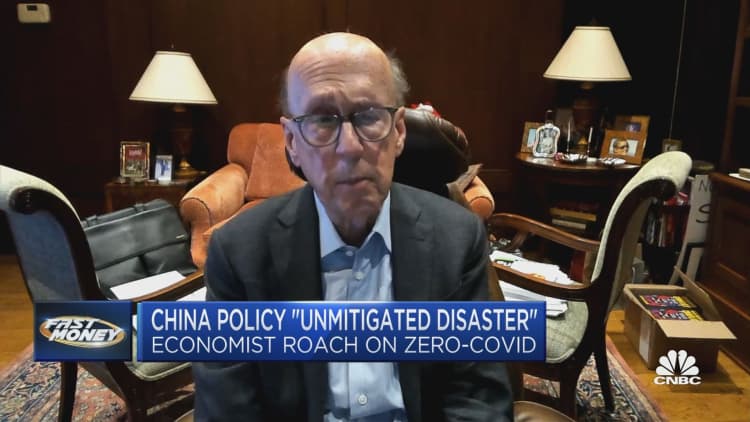People hold white sheets of paper and flowers in a row as police check their IDs during a protest over coronavirus disease (COVID-19) restrictions in mainland China, during a commemoration of the victims of a fire in Urumqi, in Hong Kong, China November 28, 2022.
Tyrone Siu | Reuters
The White House on Monday criticized Beijing’s zero Covid strategy as ineffective and said the Chinese people have a right to peacefully protest.
“We’ve long said everyone has the right to peacefully protest, here in the United States and around the world. This includes in the PRC,” a spokesperson for President Joe Biden’s National Security Council said in a statement.
Rare protests broke out against Covid lockdowns in Beijing, Shanghai, Urumqi and other cities over the weekend. Nearly three years after the virus first emerged in Wuhan, China is still imposing strict social controls to quash Covid outbreaks, while countries such as the U.S. have largely returned to normal life.
“We’ve said that zero COVID is not a policy we pursuing here in the United States,” the NSC spokesperson said. “And as we’ve said, we think it’s going to be very difficult for the People’s Republic of China to be able to contain this virus through their zero COVID strategy.”

watch now
The U.S. Covid response is focused on increasing vaccination rates and making testing and treatment more accessible, the spokesperson said.
China’s stringent Covid controls have kept deaths very low compared to the U.S., but the measures have also deeply disrupted economic and social life. In China, more than 30,000 people have died from Covid since the pandemic began, according to the World Health Organization. In the U.S., more than 1 million people have died.
Dr. Anthony Fauci, the top infectious disease expert in the U.S., said China’s approach to Covid “doesn’t make public health sense.” Vaccination rates among the elderly, one of the groups most vulnerable to Covid, are low in China compared to other countries. The vaccination campaign in China focused on people in critical positions first, those ages 18 to 59 next, and only then people ages 60 and over.
“If you look at the prevalence of vaccinations among the elderly, that it was almost counterproductive, the people you really needed to protect were not getting protected,” Fauci told NBC’s Meet the Press on Sunday. A temporary lockdown might make sense if the goal was to buy time to boost vaccination rates but China doesn’t seem to be doing that, he said.
“It seems that in China, it was just a very, very strict extraordinary lockdown where you lock people in the house but without any seemingly endgame to it,” Fauci said.

watch now
As of August, about 86% of people ages 60 and older in China were fully vaccinated and 68% had received a booster, according to a September report from China’s Center for Disease Control and Prevention. By comparison, 92% of older Americans were fully vaccinated and 70% had received a booster during that same period.
Fauci said China’s domestically developed vaccines are also not very effective.
The authors of the China CDC report said older people are more skeptical of the vaccine. The clinical trials didn’t enroll enough older people and as a consequence there wasn’t sufficient data on the vaccine’s safety and efficacy for this age group when the immunization campaign started, they wrote.
Dr. Ashish Jha, head of the White House Covid task force, said China should focus on making sure the elderly get vaccinated.
“That I think is the path out of this virus. Lockdowns and zero COVID is going to be very difficult to sustain,” Jha told ABC’s “This Week” on Sunday.
